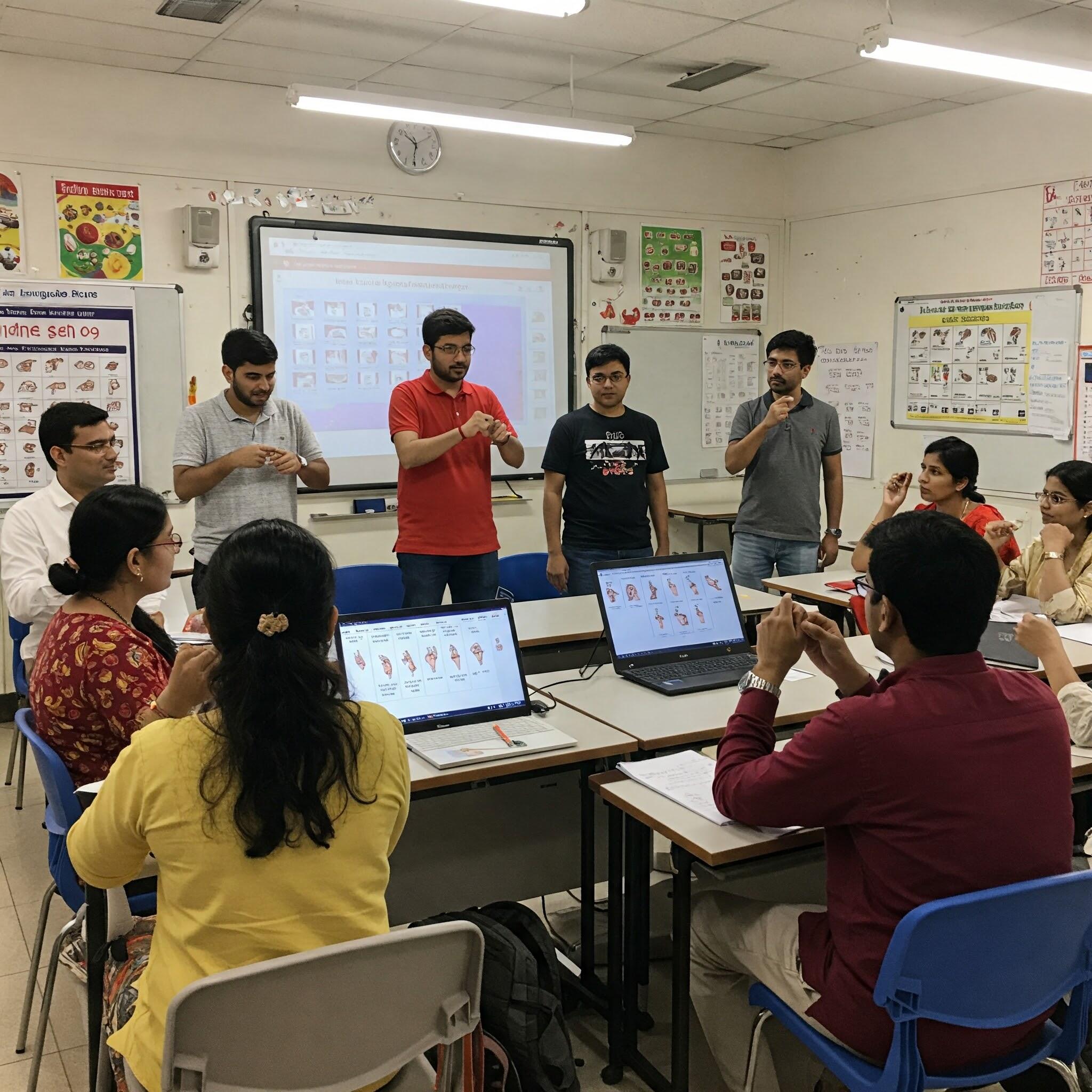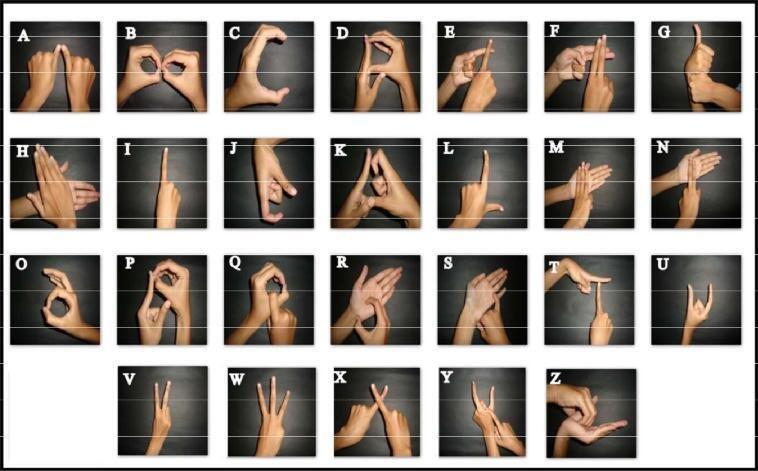India's rich tapestry of cultures and languages extends beyond the spoken word, encompassing the vibrant and essential world of Indian Sign Language (ISL). As awareness of ISL's significance grows, so does the demand for skilled educators who can bridge communication gaps and empower the deaf community. Becoming an ISL teacher is not merely a career path; it's a commitment to fostering inclusivity and enriching lives. This guide provides a comprehensive roadmap for those aspiring to embark on this rewarding journey, outlining the necessary steps to develop proficiency, obtain certification, and pursue fulfilling opportunities within India's educational landscape.
This article delves into the intricacies of mastering ISL, navigating the certification process, and exploring the diverse avenues available for sign language trainer jobs in India. We'll explore the importance of understanding the cultural nuances of the deaf community, staying abreast of evolving teaching methodologies, and leveraging available resources to enhance your expertise. Whether you're a seasoned educator seeking to expand your skills or a passionate individual eager to make a difference, this guide will equip you with the knowledge and insights needed to become a proficient and impactful Indian Sign Language teacher.

Understanding the Significance of Indian Sign Language
Indian Sign Language (ISL) is more than just a means of communication; it is a vital tool for empowerment, inclusion, and cultural identity for the deaf community in India. It is a fully developed language with its own unique grammar, syntax, and lexicon, distinct from spoken Indian languages. Recognizing and respecting ISL as a legitimate language is fundamental to fostering effective communication and breaking down societal barriers. Understanding its historical development and cultural context allows educators to appreciate the richness and complexity of ISL, ensuring they teach it with respect and accuracy. ISL enables deaf individuals to access education, participate fully in society, and express themselves creatively.

ISL and Social Inclusion
ISL facilitates communication in various settings, from educational institutions and workplaces to social gatherings and public services. When deaf individuals have access to ISL, they can actively participate in decision-making processes, advocate for their rights, and build meaningful relationships. By promoting the use of ISL, society can create a more inclusive environment where deaf individuals are valued, respected, and empowered. This also means more deaf individuals will be able to fill sign language trainer jobs in India. Accepting ISL is a step toward true equality.
Essential Steps to Becoming an Indian Sign Language Teacher
- Develop Proficiency in Indian Sign Language: The foundation of a successful sign language teacher is a deep understanding of ISL. This involves:
- Enrolling in structured ISL courses offered by reputable institutions or organizations.
- Engaging with the deaf community to immerse oneself in the language and culture.
- Continuously practicing and refining ISL skills.
- Understanding the regional variations that exist within Indian sign language.
- Pursue Formal Education and Certification: While fluency in ISL is essential, formal training in teaching methodologies and pedagogy is equally important. This is where sign language teacher certification comes into play.
- Seek out certification programs offered by recognized organizations or universities.
- These programs typically cover:
- Advanced ISL grammar and linguistics.
- Teaching methodologies for deaf learners.
- Assessment techniques.
- Educational psychology.
- Understanding the rights and needs of the deaf community.
- A formal certification enhances credibility and opens doors to professional opportunities.
- Gain Practical Experience: Practical experience is invaluable in honing teaching skills.
- Volunteer as an ISL tutor or assistant teacher.
- Seek internships or practicums at schools for the deaf or organizations serving the deaf community.
- This hands-on experience provides opportunities to apply theoretical knowledge in real-world settings.
- This experience is very helpful when applying for sign language trainer jobs in India.
- Stay Updated with the Latest Developments: The field of sign language education is constantly evolving.
- Attend workshops, seminars, and conferences related to ISL and deaf education.
- Engage with online resources and professional networks.
- Stay informed about advancements in assistive technology and educational resources.
- Continue to learn about sign language in India, as regional dialects and new signs are always developing.
- Develop Cultural Competence: Understanding the cultural nuances of the deaf community is crucial for effective teaching.
- Learn about deaf culture, history, and etiquette.
- Respect the communication preferences of deaf individuals.
- Foster a culturally sensitive and inclusive learning environment.
- Many of the cultural aspects are unique to Indian sign language and the Indian deaf community.
Certification and Training Programs in India
Several organizations and institutions in India offer ISL training and teacher certification programs. Some prominent examples include:
| Institution | Location | Focus |
|---|---|---|
| Indian Sign Language Research and Training Centre | New Delhi | ISL research, development, training, and certification. |
| Ali Yavar Jung National Institute of Speech and Hearing Disabilities | Mumbai, Various locations | Hearing impairment, sign language, and related disabilities training. |
| Various Regional NGO's | Various locations | Localized ISL training and community support. |
- Indian Sign Language Research and Training Centre (ISLRTC): A government-funded institution that plays a pivotal role in ISL research, development, and training. They offer various courses and certifications for ISL teachers.
- Ali Yavar Jung National Institute of Speech and Hearing Disabilities (AYJNISHD): This institute provides various courses and training related to hearing impairments and sign language.
- Various NGO's throughout India provide ISL education.


Career Opportunities for Indian Sign Language Teachers
The demand for qualified ISL teachers is growing across various sectors in India.
- Schools for the Deaf:
- Providing core curriculum instruction in ISL.
- Developing and adapting educational materials for deaf students.
- Collaborating with other educators to create inclusive learning environments.
- Inclusive Mainstream Schools:
- Supporting deaf students within integrated classrooms.
- Providing ISL interpretation and translation services.
- Educating hearing students and staff about ISL and deaf culture.
- Vocational Training Centers:
- Teaching vocational skills in ISL to deaf individuals.
- Assisting with job placement and workplace communication.
- Empowering deaf individuals with economic independence.
- Non-Governmental Organizations (NGOs):
- Conducting ISL training workshops for deaf individuals and their families.
- Providing advocacy and support services for the deaf community.
- Raising awareness about deaf rights and ISL.
- Corporate Sector:
- Conducting deaf awareness and ISL training for employees.
- Providing ISL interpretation services for meetings and events.
- Promoting accessibility and inclusivity in the workplace.
- Private Tutoring:
- Providing one-on-one ISL instruction to individuals and families.
- Tailoring lessons to meet specific learning needs.
- Offering flexible scheduling and personalized instruction.
- Government Sector:
- Working in various government departments that interact with the deaf community.
- Providing ISL interpretation in government programs.
- Developing and implementing policies related to deaf accessibility.
- Higher Education:
- Teaching ISL at universities and colleges.
- Conducting research on ISL and deaf culture.
- Developing ISL curriculum and educational resources.
- Online Education:
- Creating and delivering online ISL courses and tutorials.
- Reaching a wider audience of learners through digital platforms.
- Providing flexible and accessible ISL education.
Essential Skills for an Indian Sign Language Teacher
To excel as an Indian Sign Language teacher, a comprehensive skill set encompassing both linguistic proficiency and pedagogical expertise is essential. Here's a breakdown of the key skills required:
- Advanced Fluency in Indian Sign Language: Beyond basic conversational skills, a teacher must possess a deep understanding of ISL grammar, syntax, and regional variations.
- Strong Pedagogical Knowledge: Effective teaching methodologies for deaf learners, including lesson planning, curriculum adaptation, and assessment techniques, are crucial.
- Cultural Competence and Sensitivity: Understanding deaf culture, etiquette, and communication preferences is paramount for fostering a respectful and inclusive learning environment.
- Excellent Communication and Interpersonal Skills: The ability to communicate effectively with deaf students, parents, and colleagues is essential for building strong relationships.
- Patience and Empathy: Teaching sign language requires patience, understanding, and a genuine commitment to supporting deaf learners.
- Adaptability and Creativity: The ability to adapt teaching strategies to meet the diverse needs of students and create engaging learning experiences is vital.
- Knowledge of Assistive Technology: Familiarity with assistive technology, such as hearing aids, cochlear implants, and communication devices, is beneficial.
- Understanding of Relevant Legislation: Knowledge of the Rights of Persons with Disabilities Act and other relevant laws is important for advocating for deaf students' rights.
- Continuous Learning: The field of sign language education is constantly evolving, requiring teachers to stay updated with the latest research and developments.
- Ability to teach regional variations: India is a large country, and ISL has regional variations, so knowledge of, or the ability to learn, these variations is very important.
Navigating the Challenges and Rewards
Embarking on a career as an Indian Sign Language (ISL) teacher presents a unique set of challenges and profound rewards. One must be prepared to navigate the complexities of a visual language, understanding its nuances and regional variations. The initial learning curve can be steep, requiring consistent practice and immersion within the deaf community. Overcoming communication barriers, especially in the early stages, demands patience and a willingness to adapt. Additionally, the emotional investment in understanding and advocating for the deaf community's needs can be significant.
However, the rewards far outweigh the challenges. Witnessing a student's progress, seeing their eyes light up with understanding, and knowing that you've facilitated their access to education and communication is an unparalleled feeling. ISL teachers become bridges, connecting worlds and empowering individuals to express themselves fully. The role fosters personal growth, enhancing empathy, cultural sensitivity, and adaptability. The ability to break down communication barriers and contribute to a more inclusive society creates a deep sense of purpose. Furthermore, the increasing demand for ISL teachers presents stable career opportunities and the chance to make a lasting impact on the lives of countless individuals.
Finding Sign Language Trainer Jobs in India
To find sign language trainer jobs in India, it is vital to network with relevant organizations, monitor job boards, and utilize online platforms.
- Connect with NGOs, schools for the deaf, and vocational training centers.
- Utilize online job portals and professional networking sites.
- Attend conferences and workshops related to deaf education.
- Build a strong professional network within the deaf community.
- Contacting the ISLRTC can be very helpful in finding employment.

The Future of Indian Sign Language Education
The journey to becoming an Indian Sign Language teacher is a testament to dedication and a profound commitment to inclusivity. It is a path that transcends traditional teaching roles, demanding not only linguistic proficiency but also cultural sensitivity, empathy, and a deep understanding of the deaf community's unique needs.
By embracing continuous learning, seeking reputable certifications, and engaging with the deaf community, aspiring teachers can become catalysts for change, breaking down communication barriers and fostering a more equitable society. As India continues to prioritize inclusive education and accessibility, the role of qualified ISL teachers will become increasingly vital, shaping the future of deaf individuals and enriching the nation as a whole.
The demand for skilled ISL educators is a call to action, urging individuals to embrace the opportunity to empower and uplift. Whether through teaching in schools for the deaf, providing vocational training, or conducting corporate workshops, ISL teachers play a pivotal role in creating a more accessible and inclusive India. As technology advances and societal awareness grows, the potential for ISL education to flourish is immense. By pursuing this noble profession, individuals can contribute to a future where communication knows no bounds and every member of society has the opportunity to thrive.
Summarise with AI:















